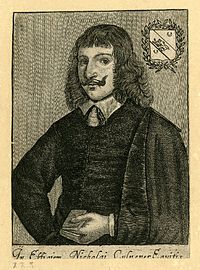Nicholas Culpeper
| Nicholas Culpeper | |
|---|---|

Nicholas Culpeper
|
|
| Born | 18 October 1616 |
| Died | 10 January 1654 London |
| Nationality | English |
| Fields |
botanist herbalist physician astrologer |
| Known for | Complete Herbal, 1653 |
| Signature | |
Nicholas Culpeper (probably born at Ockley, Surrey, 18 October 1616 – died at Spitalfields, London, 10 January 1654) was an English botanist, herbalist, physician, and astrologer. His published books includes The English Physitian (1652), i. e. the Complete Herbal (1653 ff), which contains a rich store of pharmaceutical and herbal knowledge, and Astrological Judgement of Diseases from the Decumbiture of the Sick (1655), which is one of the most detailed documents known on the practice of medical astrology in Early Modern Europe.
Culpeper spent the greater part of his life in the English outdoors cataloguing hundreds of medicinal herbs. He criticized what he considered the unnatural methods of his contemporaries, writing: "This not being pleasing, and less profitable to me, I consulted with my two brothers, Dr. Reason and Dr. Experience, and took a voyage to visit my mother Nature, by whose advice, together with the help of Dr. Diligence, I at last obtained my desire; and, being warned by Mr. Honesty, a stranger in our days, to publish it to the world, I have done it."
Culpeper came from a long line of notable people including Thomas Culpeper, the lover of Catherine Howard (also a distant relative) who was sentenced to death by Catherine's husband, King Henry VIII.
Culpeper was the son of Nicholas Culpeper (Senior), a clergyman. Culpeper studied at Cambridge, and afterwards became apprenticed to an apothecary. After seven years his master absconded with the money paid for the indenture, and soon after this, Culpeper's mother died of breast cancer. Culpeper married the daughter of a wealthy merchant, which allowed him to set up a pharmacy in the halfway house in Spitalfields, London, outside the authority of the City of London at a time when medical facilities in London were at breaking point. Arguing that "no man deserved to starve to pay an insulting, insolent physician", and obtaining his herbal supplies from the nearby countryside, Culpeper was able to provide his services for free. This, and a willingness to examine patients in person rather than simply examining their urine (in his opinion, "as much piss as the Thames might hold" did not help in diagnosis), Culpeper was extremely active, sometimes seeing as many as forty people in one morning. Using a combination of experience and astrology, Culpeper devoted himself to using herbs to treat the illnesses of his patients.
...
Wikipedia

